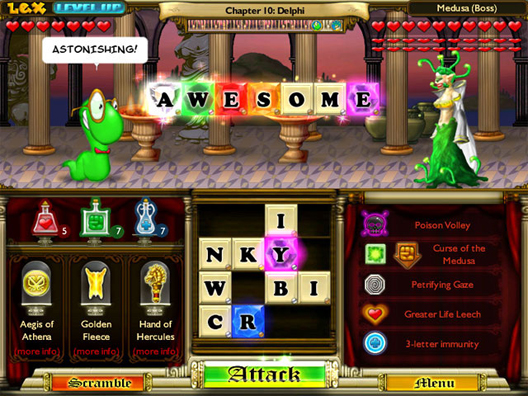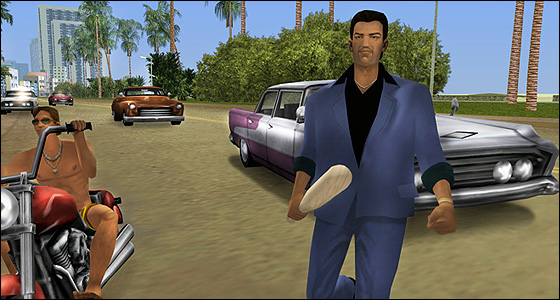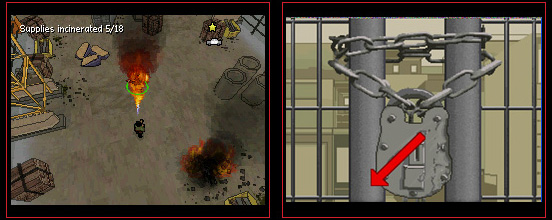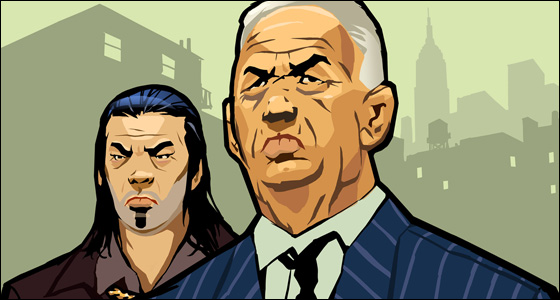Bookworm Adventures Deluxe – Linguistic Observations
April 6th, 2009

Having already fried enough grey matter with the seductive strangle of Zuma‘s colour crunching excellence, I figured that I’d take a more traditional route of gaming education and try out another one of Pop Cap’s success stories: Bookworm Adventures.
Bookworm was originally an Up-Words-eqsue word formation game, later the characteristic worm (Lex) made the leap into his own fully realized word ’em up RPG with Bookworm Adventures. The premise is relatively simple, but difficult to muster into words as many simple game mechanics tend to be. The core mechanic is set around a 4×4 grid filled with 16 random letters. You use these letters to form words which power Lex to attack an opposing enemy. Several battles, concluding with a boss battle make up a chapter, and overall Lex has several books to worm his way through. Within this framework, RPG elements are sprinkled throughout such as status effects (poison, burn, freeze), a 6 item inventory (3 items, 3 pre-selected equipment) and powered up attacks through special letter blocks. It’s a very polished package, with a lot of thought invested into it, rounded off by utterly charming characterization. It’s one of those games ideal for playing with a parent or child.
That’s the low down, you can find some (pretty cruddy) videos on Youtube showing the game in motion. Most of them have the background music muted for some reason, kinda destroys the atmosphere. Anyways, here are some ideas that I wanted to share about the game. You can download a trial version of the game from the PopCap website, and Steam as well. If you’re going to purchase, the Steam version is dramatically cheaper.*
Teaching of Morphemes
Morphemes are chunks of words, such as ‘ment’, ‘ion’, ‘ain’ and so forth. It’s difficult to decipher whether intentional or not, but Bookworm is a fantastic way to, in a sense, re-familiarize yourself with these, or at least become more conscious of them. To play Bookworm is to construct words, and to do that (in English) you look at the grid, piece together some basic morphemes, then try to glue those together to form a complete word. It’s rare that as native speakers we’d ever need to consider such a thing as how our language is constructed, it’s naturally invisible to us yet extremely visible to second language learners of English, which is why I think Bookworm is successful at placing you in the mentality of someone understanding English from an outsider’s perspective; as a second language learner.

Dictionary Deficiencies
Above I mentioned that it was difficult to tell whether or not the morpheme education was/wasn’t intended. I say this because, despite how wonderful Bookworm is, the dictionary sometimes fails to recognize some pretty common words, and yet accepts some bizarre inputs, including straight, meaningless morphemes. I regret not building a list of unrecognized vocabulary to further prove my point, but trust me on this time, the dictionary can be a little off.
Including Word Definitions
I honestly can’t grasp the intended audience for this title. Obviously it has the educational, children’s software attire going for it, but the writing and some of the jokes are particularly high caliber. He’s pretty chic for a little worm! Let’s go with the flow and assume that this is an educational game, it surprised me early on that dictionary definitions were strangely absent. My idea being that you spell a word and maybe the definition of that word appears somewhere on screen. It’d go lengths to justify some of the more obtuse words I guessed up – our inherent grasp of morpheme management makes it easy to sense out random, validated words. There’s also great merit in including definitions for people playing this game co-operatively as a parent-child team. Where the child learns new words from the parent’s assistance.
Pinyin Version
Bilingualism is a curse I couldn’t shake when playing this game. Every so often my mind would identify Chinese pinyin**, throwing me the suggestion that maybe this game could operate in other languages as well. The rules might have to be altered but it’s entirely possible. Character based languages are a little tricky when using the alphabet as an agent for character formation, perhaps radicals (combinations of strokes, the building blocks of the Chinese character system) could be used. For languages that do utilize the alpha system (say Indonesian, nama saya Daniel!), this is entirely possible, so long as adherences are made to the linguistic make up of the respective language (most common letters etc.).
Additional Readings
Eurogamer’s Review
List of English Morphemes
Does Chinese have an alphabet
How are Chinese words created
*As much as I love this game, that’s not an ad, rather an observation. Seriously, 1/3 the price on Steam! That’s killer.
**Again, WordPress refuses to align pictures correctly, just click the link >_<
Cross Blog Dialogue: GTA: Chinatown Wars #1
April 4th, 2009

You might have noticed that I’m falling into this trend where I write several posts discussing the same game but from different perspectives. Previously I might have written one post and then left it at that, but now I can’t help but want to pick apart a game from multiple angles, it’s a good curse to have I think. Some of these games I’m considering re-approaching for a third or more time to attack another interesting feature.
The new GTA: Chinatown Wars is a game that I imagined would have resulted in at least six separate articles, strangling myself in a tangled web of interconnecting ideas. In order to add a new twist to my one-sided ramblings, I’ve enlisted Steven O’Dell from the Raptured Reality blog to help flesh out a host of ideas. We’re playing through this massive game together, exchanging ideas along the way. If you too are enjoying this title, then feel free to jump into the discussion via the comment form. You can read our first two responses below:
—
Daniel: G’day Steve, thanks for joining me on this joint play through of GTA: Chinatown Wars. I’m sure it’ll be great, but to start off with I reckon we ought to provide a bit of context on our past experiences with the franchise and then based on that, what we’re hoping to get out of this game and the ensuing discussion.
I first came into contact with this series through one of the top down, 2D titles, which I didn’t think of as much more than an inexpressive crime-sim with juvenile humour and violence. The guy who introduced it to me was high on those parts of the game, but I just found that the limited perspective made it difficult to catch on. Years later I bought GTAIII on the cheap for $AUD10 at an EB Sale. I’d figured that the massive hype had to be telling of something, plus I needed something for my just acquired, graphic-card-less laptop. I only ever got to the second island though as the rain effects chugged on my machine, how shameful. It would have been months later when I bought Vice City, the only game in the series I’ve finished and by default my favourite. I also have San Andreas but the disc is terribly scratched, so I’ve never played too much. I own GTA IV too, but haven’t tried it yet (argh, it’s a trend!), my brother has completed it, which has exposed me to some of the newer elements. What about you? Did you start with the originals or the newer titles? And which is your favourite? I suspect your credentials for this series are probably much higher than mine. ^_^

This new title interests me greatly though, and for many reasons. Firstly, as I’ve written elsewhere this title is endeavourours for the handhelds, and that automatically gives it good cred on my part. Secondly, Chinese context. You may have noticed that I’m into this whole cultural business of how games represent culture with my interests in Asia, predominately China. I’m curious as to how GTA:CW will represent (American-born) Chinese and also a supposive Korean faction in the game. And lastly, this looks like a damn fine game, don’t you think? The city literally pops out at you, and the way they incorporate the DS functionality looks very intriguing. I wonder how hybridized the game feels, I mean you’ve got the older 2D style mashing with some 3D and the elements of the latest games, and then there is the DS hardware and some internet features on top. Seems like a rich brew. I’m concerned about the drug dealing elements though. Do you think that’ll be controversial at some stage? It’s a bit of a fine line to tread, as RockStar always seem to do. Over to you.
—
Steven: Hey there Daniel, thanks for giving me the opportunity to share and discuss my thoughts on GTA: Chinatown Wars with you. Our discussion should lead into some interesting things and hopefully allow us to articulate what it is exactly that we think about the game.
My history with the series also begins with the original 2D isometric titles on a family friend’s PS1. Once a week we’d probably visit and every time I was able to play the games on the console. I can remember loving it purely because I could just drive around and do my own thing, something that seemed big and important to me back then as a young child. I eventually got my own Playstation but for whatever reason never owned the GTA games. Instead the first Grand Theft Auto that I owned was GTA III which I got a month or so after getting my PS2. To put it simply, it blew me away. I went into it not realizing it was part of the franchise, not knowing what to expect and came away with levels of excitement that honestly, I had never had before. Liberty City was huge, the variety of things I could do was overwhelming and I loved it. I played it for months on end and as you’d expect, that carried over into GTA: Vice City and GTA: San Andreas as well. I completed them all to 100%, played through their stories repeatedly and also used them as the games to play when I wanted random, mindless entertainment. Fast forward to the current generation and April of last year; the release of GTA IV again blew me away. Not because of the size of the city or the things you could do within, though, it blew me away because the narrative managed to grip me and hold on tight and I wasn’t expecting that. I knew it had one, I knew Rockstar was intending on creating a more compelling and in-depth narrative, but it still went above and beyond my expectations for the title. Then, as I have outlined in a post of mine recently, the downloadable expansion The Lost And Damned came and reeled me straight back in, providing a different perspective on Liberty City that I found fascinating – especially after seeing TV shows like ‘The Wire’ that do a similar thing. I have written about how I have grown up with the Grand Theft Auto series, though, so I will move onto the expectations I have for GTA: Chinatown Wars.

The things I am expecting from the game are, well, I’m not entirely sure. I am however looking forward to seeing what Rockstar Leeds have done with the game: how they’ve used the 2D perspective in combination with 3D, the way Liberty City looks and feels when compared to GTA IV, where the developer’s priorities lie (did they focus on the narrative ala GTA IV, on gameplay due to the new methods of input courtesy of the DS’s features, or something else entirely?) and whether they have managed to successfully transition what we know and love about the franchise into the new format. Beyond that I don’t really know, the very fact that it is a GTA game on the DS completely throws away any pre-conceived ideas of what I think it could be as I go into the title. I’m just going to take it how it comes and you know what? I don’t think that’s a bad thing. It might even make it more enjoyable.
With our histories and expectations out of the way, I think it is time we actually played the game and discuss some of our initial impressions of it so have you begun playing yet? Has anything in particular stood out to you in the early parts of the game? Has it met your expectations, exceeded them or have you found it disappointing? I look forward to hearing your thoughts.
—
Daniel: Just to tangent for a second, you might find this post by Jeremy Parish quite interesting. In it he discusses Dragon Quest V in relation to how the game takes on different meanings with the maturation of the player. It’s similar to your article regarding your past experiences with the GTA franchise.
Anyways, I’m about 15% through the game, and thoroughly enjoying it. I’ve dabbled in most of the core activities; drug dealing, rampages, noodle delivery etc and they’ve all been quite good. Overall I’m thrilled about this title. Technically it’s an unbelievable achievement, yet above that it looks much more visually interesting. Love at first sight perhaps. As I mentioned briefly in my first response, the game does indeed feel like a complete hybrid of ideas, the best of which is brought out with the DS hardware. I think it’s quite safely met my expectations. What about you? This game is flying pretty low on people’s radar despite some absolutely killer press. Does this do the series justice?
It’s hard to say what has stood out the most for me, it all seems like a conglomerate of equally ambitious and successful ideas. Something that I’ve found with this iteration is that the missions don’t feel like such a drone. Even GTA IV copped criticism for the same old “drive here, do that” mission structure. GTA:CW is interesting in that each mission – at least so far – has felt individual and unique. Have you found this too? I chalk a large part of it up to the DS touch screen implementation. Every second mission incorporates some form of touch screen interaction, such as defusing bombs or keeping a dying patient alive. You can’t really predict these, so it adds a new edge to the formula. There are a lot of individual components that are worth mentioning, I’m sure we’ll get to those later, for now though, what’s caught your attention the most?
—
Steven: Does it do the series justice? Absolutely, in fact I think it demonstrates that the franchise has legs; that no matter what Rockstar focus on (mechanics, narrative, perspective, etc), the series will hold up. They’ve created a game on a platform that no one expected to see the franchise and instead of just creating it for the sake of taking advantage of the DS’s insane popularity, they have instead put the effort in to create something that works within the context of the handheld while also providing a game that is different yet still manages to be exactly what it is, a Grand Theft Auto game. Perhaps I am biased towards the franchise but to me, that is a remarkable achievement. DS specific features like the drug-dealing or the fact that the DS stylus is used in many varied ways is almost irrelevant, the game is Grand Theft Auto through and through and that is all that matters.

With that said, those mechanics and features are worth looking into and I can honestly say that so far, I’ve been surprised a lot more than I was expecting. Nearly everything you can do in the game uses the stylus in some way and the thing that amazes me is that none of it gets repetitive. Creating Molotov Cocktails; searching through bins to find weapons or drugs; hotwiring cars – all of it done by touch screen and all of it done in logical ways. As you say the missions are varied as well – I’m also about 15% into it and so far each mission I have completed has been unique. There are no cookie-cutter missions and I can’t help but respect the creativity being shown here. It could change later in the game but for now, it is above and beyond any expectations I had for it. Especially when you consider just how nice it looks and, perhaps more importantly, how smoothly it runs. You called it a technical achievement and I agree wholeheartedly.
The attention to detail in the game is the other thing that sticks out so early, though I shouldn’t be surprised given Rockstar’s reputation for it. I was surprised to see series staples such as weather effects and off-hand pedestrian comments – shocked when I stumbled upon something random like an accident with the intersection blocked off by police cars, a fire truck dousing a fire and an ambulance racing to someone’s aid – sure we see it all the time in the console games, but the amount of detail I’ve seen so far is surprising when I stop to consider the platform I am playing the game on. And to think, I’m only 15% into it – What else is awaiting me? What else will I discover in Liberty City? I can’t wait to play more and find out.
To summarize, Chinatown Wars met my expectations and surpassed them. I should have known it would do so based on previous games but regardless of that they’ve created something special and I’m curious to know why it is seemingly flying under everyone’s radar. Initial excitement has died down a little now which allows me the chance to focus on other elements such as the narrative, so I’ll hand it you by asking – what do you think of it so far? Have you found it interesting or compelling due to the Chinese angle? Have you found the characters intriguing or do you need to see more before you can form your thoughts?
—
More discussion to follow shortly.
Kirby 64: Silent Cutscenes
March 29th, 2009
I’ll probably follow this up with some generally impressions later on, but I wanted to spend this initial post discussing my favourite aspect of Kirby 64. If you have 11 minutes to spare (or even just a couple), and don’t mind having the game spoiled for yourself then take a look at the cutscene compilation below.
http://www.youtube.com/watch?v=U40hVo77qgwThe cutscenes in Kirby 64 are interesting and not just on the cute factor alone. I have to fess up and say that the animation and facial expressions of these miniature stories drew me into the idea of posting solely about them in the first place. Kirby’s draw dropped curiosity and King Dedede’s sullen pessimism are all so charmingly rendered with the simplest of shapes and textures. They colour the vanilla gameplay sequences with up-beat, positive energy – oodles of happiness. It’s not my key point, but damn, this game is adorable.
The voiceless cast rely on miming actions, and exaggerating facial expressions and body movements to convey their feelings of a given situation. In a way they’re similar to the 8 and 16-bit characters before them, which had no choice but to frantically mime their actions as a way of squeezing personality out of a handful of pixels. There is a distinct difference between the two though. Kirby and pals jesture because they lack a voice, a language (beyond odd ‘yelps’), the 8/16-bit characters did this because they lacked the respective technology and instead leaning on text. If they had a choice, they’d probably be speaking. Kirby and friends don’t even have text, nor the will or ability to speak.
Kirby is and always has been a children’s game. It’s a game many gamers, including myself thoroughly enjoy, but generally speaking the series is usually light on challenge and saturated in a care free vibe. It’s perhaps aimed at an audience even younger than the general perception of the children’s audience, since not even language is a barrier to entry. Many childrens games and media feature talk and dialogue, Kirby doesn’t. It’s similar to the Teletubbies in a way, except void of any fictional exclamation language. The freedom here for younger children, or at least children still processing language to understand is very accessible.
Kirby 64 like some other media normalizes dumbness – that is lacking the ability of speech. It’s a game that hadn’t vocalized it’s cast in an era where voice boxes were being added to old friends. While I’m no particular expert on the subject, I think there is obvious merit in a game that avoids speech altogether, instead focusing on other means to communicate. I wonder how such games and media like this are interpreted from people with a background of not being able to speak. I guess it would be something of a mild encouragement to see this transition in a medium like video games. Kirby 64 portrays the lack of speech (like everything in the game) in a pleasant nature. It doesn’t focus on the frustrations of miscommunication, rather every exchange is a success. I wonder what effect this has on such an audience, if any.
I discussed this briefly with Richard Terrell from the Critical Gaming blog as well, and he further likened it to the idea of silent films which is another suitable example.



 Game Design Companion: A Critical Analysis of Wario Land 4 - $7.99
Game Design Companion: A Critical Analysis of Wario Land 4 - $7.99 Level Design: Processes and Experiences
Level Design: Processes and Experiences Speed Boost: The Hidden Secrets Behind Arcade Racing Design - $5.99
Speed Boost: The Hidden Secrets Behind Arcade Racing Design - $5.99 Adventures in Games Analysis: Volume I - $5.99
Adventures in Games Analysis: Volume I - $5.99







